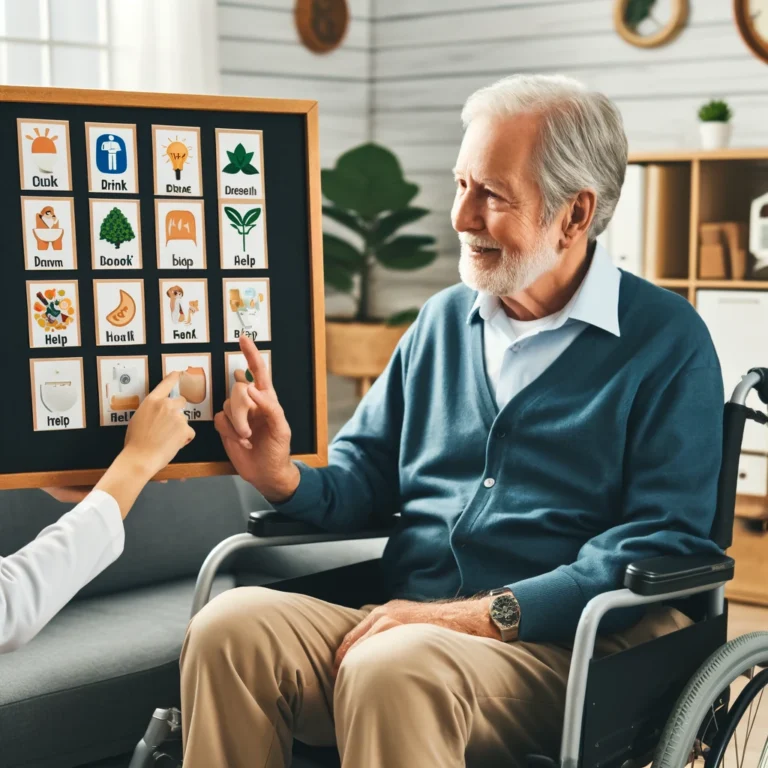
Knowing Your Patient’s History When Treating Global Aphasia
In the challenging field of speech therapy, certain cases profoundly impact both the therapist and the patient. Bernard’s story is a prime example. His journey of rehabilitation emphasizes the importance of knowing your patient’s history and utilizing innovative technology in treating global aphasia.
Meeting Bernard: A Journey in Global Aphasia Treatment
During the autumn of 1985, in my role as a speech therapist at a Pennsylvania rehabilitation center, I met Bernard, a man in his mid-70s. He had recently experienced a severe global stroke, affecting his mobility and severely limiting his speech, comprehension, and other communication abilities. Knowing your patient’s history is crucial in such cases to tailor the most effective therapy plan.
From our initial interaction, Bernard’s acute awareness of his challenging situation was evident, despite his communication difficulties. Efforts to foster speech, writing, and gestures only intensified his frustration. Facing the severe implications of global aphasia with Bernard was an unprecedented challenge in my career. His near-complete disconnection from expression, mirrored by his palpable frustration, underscored his awareness and struggle. It was akin to knowing how to drive but being alone, stranded in a car devoid of steering and brakes.
Discovering Bernard’s Past: Building a Therapeutic Connection
Realizing the need to connect with Bernard on a deeper level, I embarked on uncovering more about his past. My research led me to a newspaper article about his riding stable, a mere stone’s throw from our facility. This discovery and subsequent discussions about the article, accompanied by photographs, formed our initial, modest bridge to communication. The absence of the internet’s convenience during this period made this discovery all the more significant. This illustrates the importance of knowing your patient’s history in creating meaningful connections and effective treatment plans.
The Breakthrough with Technology: Enhancing Global Aphasia Rehabilitation
Considering Bernard’s communication barriers, the path ahead seemed daunting. At that time, the influx of technology into global aphasia therapy was still in its early stages. Nonetheless, the emergence of home computers provided a glimmer of hope. Leveraging my prior experience as a programmer and my familiarity with computers, I invested in a Commodore 64 computer, a speech synthesizer, and a 15×15 touchpad. I used this setup to create a communication aid for Bernard, programming the touchpad to verbalize words when corresponding pictures, like “Drink,” “Help,” and “Bathroom,” were pressed. This innovative approach marked a significant advancement in our speech therapy sessions and highlighted the benefits of using technology in treating global aphasia.
During our trials with this novel device, Bernard’s response was encouraging. He seemed fascinated by the concept of initiating spoken words by simply touching a picture.
A Memorable Last Session: The Patient-Therapist Bond
Our last session together is a memory etched in my mind. Bernard exhibited consistent effort, a smile, and a sense of tranquility. Heartbreakingly, he passed away in his sleep following that session.
Although Bernard’s journey ended, the insights and lessons learned from our time together were invaluable. He came to realize that the therapy was not just a clinical process but a bridge to facilitate his communication needs. This realization was a significant milestone in our global aphasia rehabilitation sessions.
Lessons from Bernard’s Case: The Importance of Knowing Your Patient’s History
Bernard’s case profoundly illustrates the importance of knowing your patient’s history, flexibility, innovation, and the relentless pursuit of developing individualized communication bridges. His story is a poignant reminder that the realm of aphasia rehabilitation is not just grounded in scientific methodology but is influenced by the art and significance of human connection. This balance between a scientific approach and empathetic connection is at the heart of effective global aphasia treatment, as demonstrated by my experience with Bernard.
